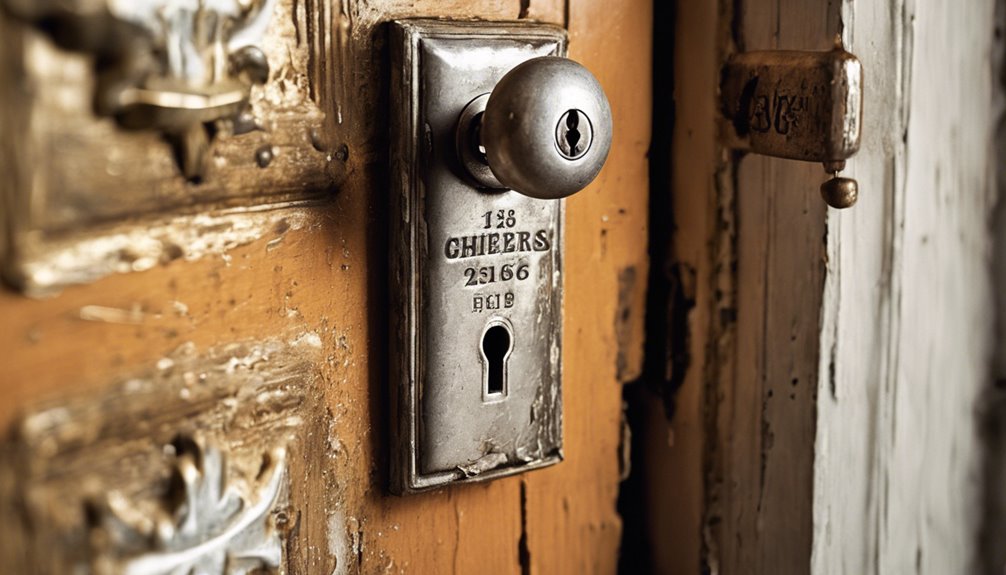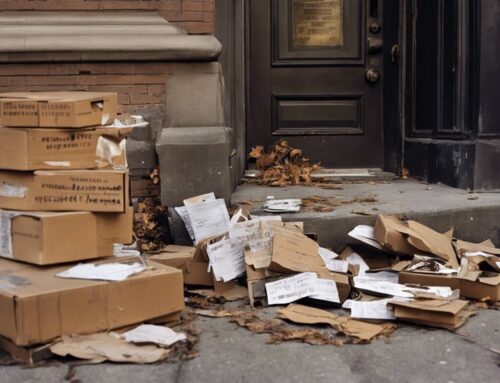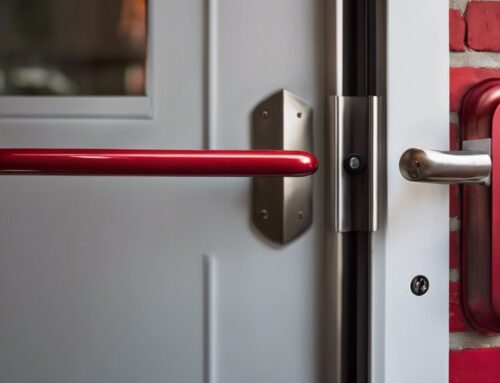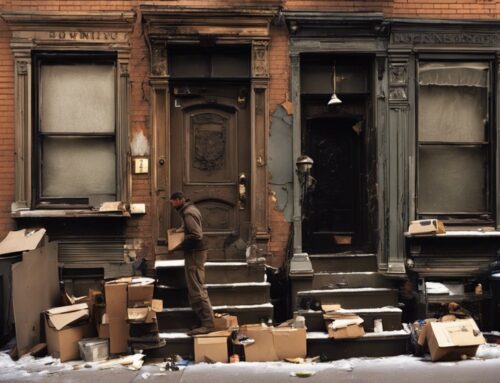When it comes to lock changes in New York, understanding your rights as a tenant or landlord can really make a difference in your living situation. You might not realize that landlords generally can't change locks without your permission, except in emergencies, while tenants have their own rights to request lock changes. But there are specific guidelines and legal implications that you should know about to avoid misunderstandings. So, what happens if someone breaches these rules? Let's explore the key details that could impact both your peace of mind and your legal standing.
Key Takeaways
- Landlords must obtain tenant permission for lock changes unless it's an emergency, or they risk violating the Unlawful Eviction Law.
- Tenants have the right to request lock changes if safety concerns arise, and landlords must comply within a reasonable timeframe.
- Tenants can change locks but must provide a duplicate key to the landlord, notifying them within a specified timeframe.
- Lease agreements must clearly outline lock change policies, including tenant and landlord responsibilities regarding security and access.
- Violating lock change regulations can lead to legal consequences for landlords, including fines and potential lawsuits from tenants.
Landlord Restrictions on Lock Changes
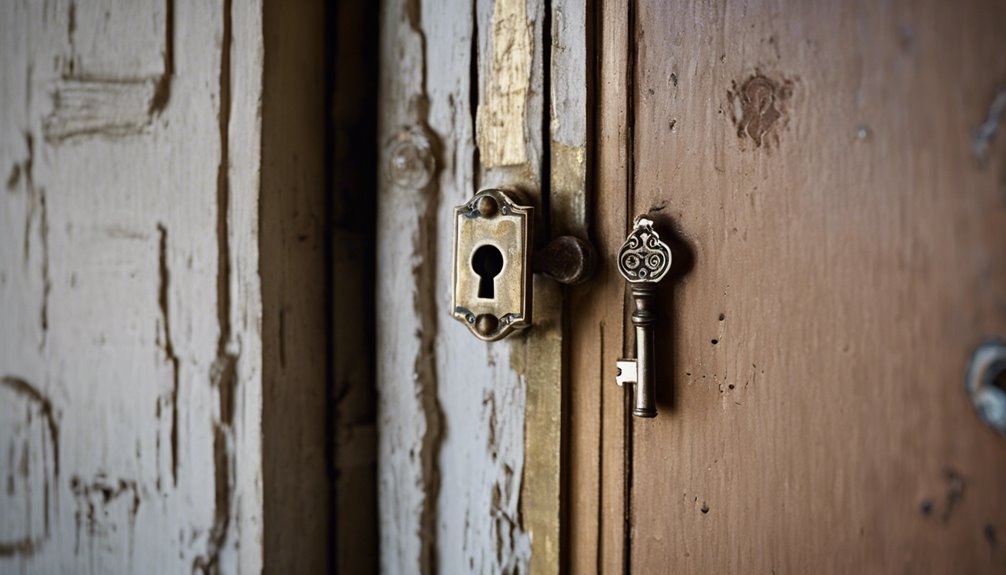
When considering lock changes, it's vital to know that landlords in New York have strict restrictions. They must obtain your permission before changing locks, except in emergencies. If a landlord decides to change locks, they must provide you with a key unless there's a warrant of eviction involved. Failing to do so could lead to a violation of the Unlawful Eviction Law, placing them in legal trouble. Additionally, locksmiths may become involved in the process, as they are responsible for carrying out the legal obligations that accompany any lock changes during an eviction. After an eviction, landlords are legally required to follow specific legal steps during the lock change process to ensure compliance with state laws.
Additionally, if you're faced with unauthorized lock changes, it's important to understand your rights. It's unlawful for landlords to utilize lockouts as a means to force eviction. Without a court order, they can't lock you out. In cases where illegal lock changes occur, you can report the situation to the police and pursue your remedy in Housing Court.
Landlords must also give you reasonable notice before entering your apartment for lock changes, barring emergencies. In urgent situations, they can change locks without prior permission, but they're still obliged to hand you a key afterward. It's crucial to remember that statutes vary significantly between states regarding lock changes, which strengthens the case for knowing your rights.
It's significant to recognize that landlords who disregard these regulations not only risk penalties and lawsuits but also damage the relationship with their tenants. The repercussions of illegal lock changes extend beyond legal complications and can lead to ongoing disputes, making adherence to the law vital for fostering a respectful landlord-tenant dynamic.
As a tenant, being informed about these restrictions empowers you to assert your rights effectively.
Tenant Rights for Lock Changes
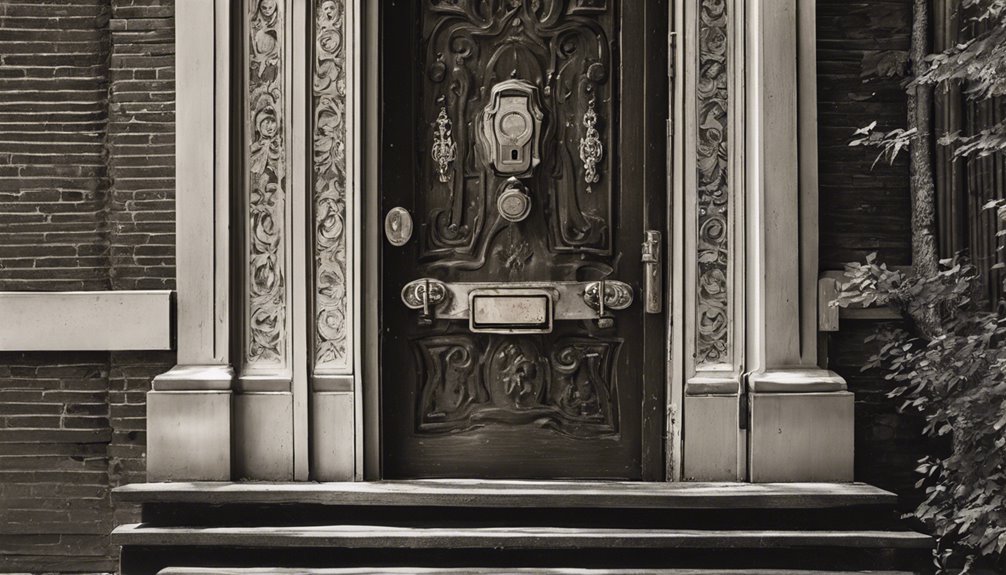
Although you may feel vulnerable regarding your home security, as a tenant in New York, you have the right to request lock changes for valid reasons, such as concerns about safety or issues with keys left by previous tenants. Your landlord is obligated to perform the lock change within a reasonable timeframe if your request is legitimate. Additionally, it is important to note that employment laws also emphasize the responsibilities of landlords regarding property security. Locksmiths must adhere to state laws that regulate lock picking and changes, ensuring compliance in their practices.
Here are some important points about your rights concerning lock changes:
- Security Reasons: If you've experienced a break-in or lost your keys, you can request a lock change to secure your home.
- Previous Tenant Keys: If the landlord fails to change the locks after a prior tenant leaves, you can insist on a lock change to protect your security.
- Unauthorized Access: Should your landlord continually enter your property without notice (except in emergencies), you may have the right to change the locks to guarantee your privacy. Tenants must have a lease or be legal occupants for at least 30 days to exercise these rights.
- Provisions for Installation: You're allowed to install your own locks but must provide your landlord with a duplicate key to comply with your lease.
Lease Agreement Guidelines
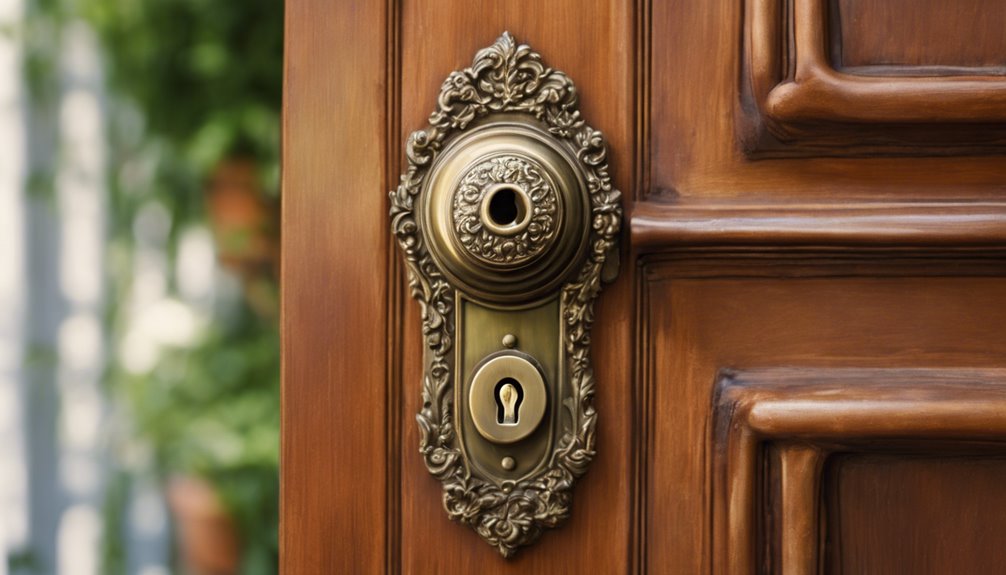
Understanding lease agreement guidelines in New York is fundamental for both tenants and landlords, as it lays the groundwork for a clear and fair rental relationship.
A lease must start with basic information, including the names of both parties and the property address. You should also specify the rent amount, due date, and lease duration. If a security deposit is required, outline the amount and how it's held, guaranteeing it goes into a separate New York State bank account. A well-structured lease may also include details about rekeying locks to enhance security after a tenant moves out, particularly as master key systems may require proper documentation for legal management.
Significant clauses play an essential role in any lease. Clearly state occupancy limits and notify landlords about potential roommates. Specify responsibilities for utilities and maintenance, as well as any entry protocols for the landlord. It's wise to include usage rules regarding noise levels, pet policies, and smoking.
Written lease agreements are critical; those longer than one year must be in writing to be enforceable. Although verbal agreements can be binding for shorter leases, they're generally not advisable. Confirm that both of you sign the rental agreement for enforceability.
Additionally, it is important to note that the maximum security deposit is limited to one month's rent, which is a crucial detail for both parties to understand. Lastly, be aware of notice and termination guidelines. A landlord must provide a written notice depending on the lease's duration, with specific rules for early termination. Verify the lease reflects renewal terms and includes necessary legal disclosures.
These guidelines help maintain transparency and protect your rights, fostering a respectful landlord-tenant relationship.
Legal Consequences of Violations
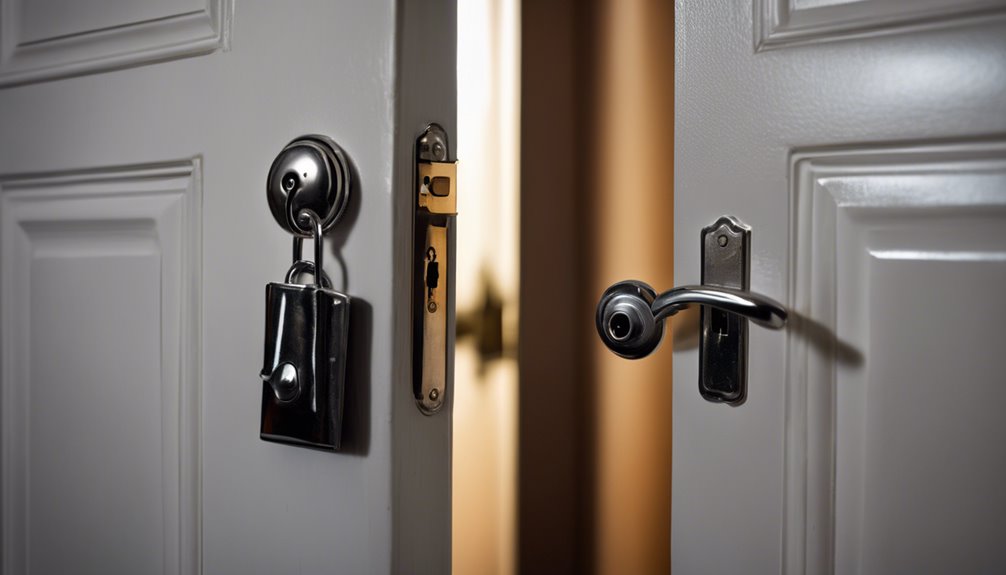
Landlords in New York face serious legal consequences for violations of tenant rights, especially regarding unlawful eviction practices like changing locks without providing a key. Such actions violate New York City's Unlawful Eviction Law and can lead to significant penalties for landlords. This can further complicate situations if a landlord is relying on a licensed locksmith to execute changes improperly.
If you're a tenant who experiences this violation, it's essential to understand your options.
Here are some potential legal consequences landlords could face for such actions:
- Fines and Restitution: Landlords found guilty of illegal lockouts can incur hefty fines and may be required to compensate tenants for damages.
- Housing Court Cases: You can report illegal lockouts to the police and pursue a case in New York City's Housing Court to reclaim your apartment and seek damages.
- Lawsuits for Wrongful Eviction: Tenants can file lawsuits against landlords for wrongful eviction, which can result in further legal repercussions for the landlord.
- Property Management Rights: Repeated violations can escalate penalties, including the potential loss of property management rights.
Additionally, landlords engaging in unlawful lock changes may also be at risk of facing legal repercussions similar to unlicensed locksmiths in New York.
Emergency Lock Change Situations
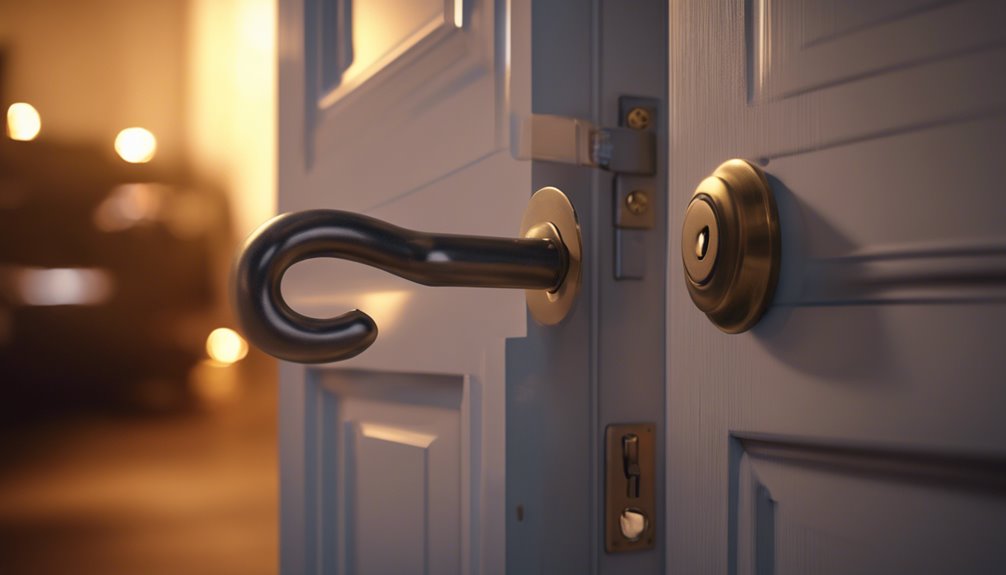
When faced with an emergency, such as a threat to your safety or a compromised lock, you have the right to change your locks without waiting for your landlord's approval.
Emergencies can include situations like domestic violence, damaged locks that endanger your security, or immediate threats to your well-being. Under New York law, you're empowered to act swiftly to protect yourself. In such circumstances, consider reaching out to a 24-hour mobile locksmith service provider for immediate assistance.
While you can change your locks in these situations, it's essential to inform your landlord as soon as possible. You're required to provide them a duplicate key for the new locks within a specified timeframe—often within five days. Failure to do so could be considered a lease violation.
Before taking action, double-check your lease agreement for any specific clauses regarding lock changes. Although you can install your own locks, guarantee your actions comply with state laws and your lease terms. Additionally, you may want to consider hiring a 24-hour locksmith service to ensure that the lock installation is handled professionally and efficiently.
Document your communication with your landlord to avoid disputes.
Emergency lock changes are serious. If you feel that your safety is in danger, don't hesitate to take action, but make sure you follow the necessary steps to notify your landlord.
This balance of swift action and responsible communication helps protect your rights as a tenant while maintaining a good relationship with your landlord. By understanding and exercising these rights, you stand firm in protecting your safety and peace of mind.
Frequently Asked Questions
Can a Tenant Change Locks Without Informing the Landlord First?
You can't change locks without informing your landlord first.
Most lease agreements require you to get permission before making such changes.
If you do decide to change the locks, make sure to provide your landlord with a duplicate key as well.
Failing to follow these rules can lead to serious consequences, including potential eviction.
Always check your lease terms and consider discussing your intentions with your landlord to avoid complications.
What Happens if a Landlord Refuses to Return a Key?
If a landlord refuses to return a key, you have the right to act.
Gather documents proving your lawful occupancy, like lease agreements or rental receipts, and seek help from the Police Department or the Court.
You can file a complaint for unlawful eviction as well.
If the situation escalates, consider mediation or pursuing a claim in Small Claims Court to enforce your rights and regain access to your home.
Can Tenants Change Locks if the Landlord Is Unresponsive?
If your landlord's unresponsive to your request about changing locks, you have options.
You can prioritise your safety and install new locks, especially if you feel vulnerable.
However, it's crucial to inform your landlord and provide a copy of the new key.
While you seek freedom in your living space, remember that clear communication can prevent misunderstandings.
Trust your instincts, but be certain you're aware of any potential repercussions regarding your lease.
Are There Costs Associated With Legally Changing Locks?
Yes, there are costs associated with legally changing locks.
If you're a tenant and request a lock change for security reasons, the landlord usually covers the expense unless your lease states otherwise.
However, if you change the locks without permission, you might face deductions from your security deposit to restore the original locks.
Always check your lease agreements for any specific clauses about costs related to lock changes to avoid unexpected expenses.
How Can Tenants Prove They Were Unlawfully Locked Out?
Did you know that nearly 40% of tenants experience lockout issues at some point?
To prove you were unlawfully locked out, gather documentation showing at least 30 days of occupancy, like rent receipts and utility bills.
Collect any correspondence from your landlord, and consider witness statements for support.
If necessary, report the situation to law enforcement for immediate help and pursue legal action in Housing Court to restore your rights and access.
Conclusion
Steering through lock changes in New York doesn't have to be a full-blown legal drama! By clearly understanding your rights as a tenant or landlord, you can avoid potential crises that could rival a soap opera episode. Remember, communication is key—talk it out, share those spare keys, and keep the peace. With a little knowledge, you can guarantee your living situation stays as drama-free as an afternoon tea party. After all, a locked door shouldn't leave you in suspense!

